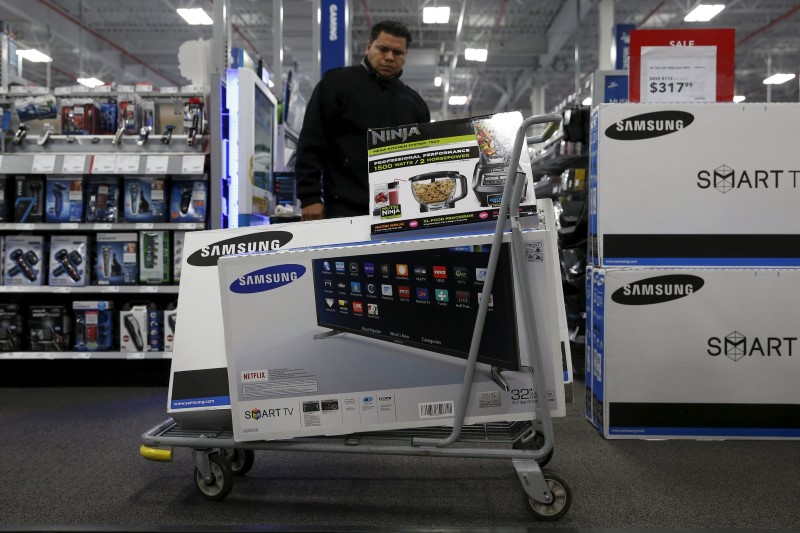Novo Nordisk, Eli Lilly fall after Trump comments on weight loss drug pricing
On Friday, Goldman Sachs analyst Kate McShane revised the price target for Best Buy shares, listed on (NYSE:BBY), from $116.00 to $94.00 while retaining a Buy rating on the stock. Currently trading at $66.32, Best Buy appears undervalued according to InvestingPro analysis. The adjustment came after Best Buy’s shares fell approximately 7.3% following the announcement of a slight sales miss and a reduction in their fiscal year 2026 guidance, contributing to a significant 24.6% decline over the past six months.
Best Buy’s same-store sales (SSS) experienced a downturn, primarily due to weaker performance in more discretionary categories. The company, which maintains a solid financial health score of 2.46 according to InvestingPro, anticipates that new products and innovations may foster improved trends as the year moves forward. Despite the lowered guidance, which now accounts for the impact of tariffs, the tariffs are deemed more manageable than expected. Best Buy has successfully decreased its cost of goods sold (COGS) exposure to China, while maintaining a healthy gross profit margin of 22.6%.
In addition, management provided updates on alternative revenue streams. Although the results did not meet expectations, Goldman Sachs maintains a positive outlook on Best Buy, suggesting that the stock’s decline was more pronounced than their revised estimates warranted. This perspective implies that the market reaction might have been excessive.
Goldman Sachs analysts believe that while Best Buy has faced challenges, such as losing market share in the appliances category, the retailer is in a strong position to capitalize on increasing demand spurred by the ongoing replacement cycle and purchases driven by innovation, even if prices rise due to tariffs.
Furthermore, Best Buy’s investments in alternative revenue streams, such as its Marketplace and advertising platforms, are expected to contribute to margins and sales growth over time. The company has demonstrated strong shareholder returns, maintaining dividend payments for 23 consecutive years with a current yield of 5.7%. The new price target of $94 reflects these considerations and the potential for incremental positive developments related to the company’s tariff exposure. For deeper insights into Best Buy’s financial health and growth prospects, including 8 additional exclusive ProTips and comprehensive valuation metrics, explore InvestingPro’s detailed research report.
In other recent news, Best Buy has seen several adjustments to its stock price targets from major financial firms. DA Davidson reduced its price target for Best Buy to $90 while maintaining a Buy rating, citing improved tariff handling and potential positive product cycle accelerations. Jefferies also lowered its target to $88, keeping a Buy rating, and noted that Best Buy’s management is effectively managing tariffs, with expectations of double-digit EPS growth in the coming years. Meanwhile, JPMorgan adjusted its price target to $95, maintaining an Overweight rating, following mixed financial results and a reduced guidance for the second quarter.
Truist Securities raised its target to $69, maintaining a Hold rating, as Best Buy’s first-quarter performance met expectations, though sales momentum remains subdued. Best Buy’s efforts in diversifying sourcing and vendor negotiations have led to better-than-expected tariff mitigation results. However, Truist also maintained a previous Hold rating with a $64 target, highlighting a steady continuation of core business trends and a dividend yield of approximately 5%. These developments reflect a cautious yet optimistic outlook from analysts on Best Buy’s ability to navigate current market challenges.
This article was generated with the support of AI and reviewed by an editor. For more information see our T&C.
